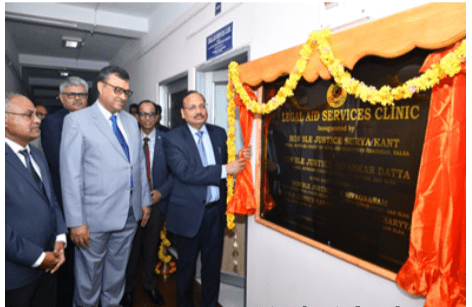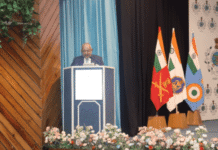Sri Vijaya Puram: A Legal Aid Services Clinic was inaugurated at Andaman Law College on June 21, signalling a key initiative aimed at strengthening legal support structures in the Union Territory. The clinic is expected to serve both as a community legal assistance centre and a live training platform for law students, helping bridge the gap between legal theory and practice.
The event was attended by senior members of the judiciary, including Supreme Court Judges Surya Kant and Dipankar Datta, Chief Justice of the Calcutta High Court T.S. Sivagnanam, Calcutta High Court Judge Sabyasachi Bhattacharyya, and Justices Jay Sengupta and Bivas Pattanayak, currently presiding at the Circuit Bench in Sri Vijaya puram.
The initiative is backed by the National Legal Services Authority and the Andaman and Nicobar State Legal Services Authority (SLSA). With limited legal infrastructure in the islands and often restricted access to legal aid for the underprivileged, the clinic is expected to serve as a vital tool in improving public legal awareness and assistance.
For years, higher education in the Andaman and Nicobar Islands has struggled with a significant imbalance, strong emphasis on theoretical knowledge with limited exposure to hands-on, real-world application. This disconnect has often resulted in a gap between academic qualifications and employable skills, leaving many graduates underprepared for professional challenges.
The Legal Aid Services Clinic at Andaman Law College marks a crucial shift towards addressing this longstanding issue. By offering law students practical experience under the guidance of seasoned professionals, the clinic bridges classroom learning with on-ground legal work. Students can now engage directly with real cases involving family disputes, tenancy issues, and social welfare rights, while also contributing to community legal aid.
This exposure not only enhances their legal acumen but also improves their readiness to join the workforce as skilled, socially aware professionals- marking a progressive move toward a more application-oriented educational ecosystem in the islands. At the same time, it will offer citizens a platform to seek legal advice and basic support, especially for issues concerning family law, tenancy, land disputes, and legal rights under social welfare legislation.
The clinic’s opening marks a step forward in efforts to make justice delivery systems more inclusive and locally accessible. As the demand for legal literacy grows in the islands, such decentralised initiatives are expected to serve as a model for similar institutions in the region.
The Legal Aid Services Clinic is likely to collaborate closely with other legal services institutions in the territory, thereby creating a more integrated and responsive network. With active participation from both the judiciary and legal academia, the platform promises to enhance the role of legal education in community service while addressing the pressing need for accessible justice.





